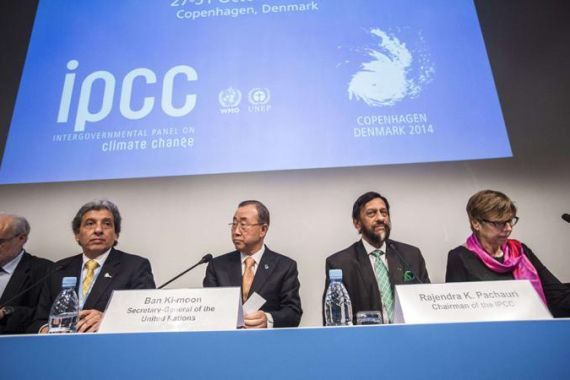All talk and little action on climate change
Citing dire consequences of global warming, new report aims to inspire politicians to act – but don’t hold your breath.

Interpreting the mire of UN climate-speak, I’d say the message boils down to this: attain near zero emissions by 2100 or billions of our descendants not yet born will be in big trouble. That means we have to start now, tripling or even quadrupling our use of renewable energy so it represents 80% of energy sources by 2050.
This latest report from the UN’s Intergovernmental Panel on Climate Change (IPCC) is a final précis of the most comprehensive assessment on climate change to date, conducted by more than 800 scientists. Three reports have been released over 14 months, respectively laying out the causes, the impacts and the solutions.
This “synthesis” report is a kind of greatest hits compilation, amalgamating the findings into one document, aiming to inspire politicians to dismantle the logjam of international inaction and get a global treaty signed and sealed in Paris in 2015. You never know.
The report emphasises that global warming is “unequivocal” and that man’s influence is clear and growing. It says the world is on course to experience ”severe and pervasive” negative impacts unless it takes rapid action to cut greenhouse gases.
And if nothing changes? Well, it ain’t pretty. Hurricanes will become more powerful, floods and drought will be more frequent, there’ll be food insecurity, and yes, sea level rise is coming to a coastline near you. (Florida, for example, is already seeing record high tides sloshing down high streets, to say nothing of the problems being faced by the low-lying islands of the Pacific).
The target is to stop the average temperature rising beyond 2C, and on current trends, we’re way behind the game.
Many nations are concerned that action will damage their economies. But the report claims ambitious mitigation would reduce economic growth by only about 0.06%. “Compared to the imminent risk of irreversible climate change impacts,” said Youba Sokona, who worked on the report, “the risks of mitigation are manageable.” And the longer we wait, the more it will cost.
As a side note, it’s been interesting to observe how institutions outside the scientific realm are acknowledging the dangers – insurance corporations, financial centres and not least the military. Last month, the Pentagon issued a report asserting that climate change poses an immediate threat to national security, with “increased risks from terrorism, infectious disease, poverty and food shortages.”
So what next? There is currently no global agreement on how to tackle climate change. Every year there’s little to report but failure on international negotiations. Now all roads in the first instance lead to Lima, Peru in December. Here, negotiators from nations around the world will convene to try and find the basis for a treaty to curb warming to the 2C level. Prepare yourself for two weeks of intense climate debate, from emissions targets and carbon credits to rows between the developing and developed countries over who should pay what.
Then, a year later, it’s that crunch summit in Paris where world leaders must ink their agreement to a binding treaty. Anyone holding their breath?